Exhibitions
25 Sep 25 Oct 2021
Life and Herstories (Autobiography as Dialogue)
Chiara Camoni and Stefania Galegati
A cycle of exhibitions, actions and meetings curated by Daria Filardo
You and your friends are cordially invited to the opening of the exhibition on Saturday 25 September at 7.30.
25.09 – 25.10.2021
(first part)
Life and Herstories (Autobiography as Dialogue): Chiara Camoni and Stefania Galegati
10.11 – 17.12.2021
(second part)
Life and Herstories (Autobiography as Dialogue): Helen Cammock and Ottonella Mocellin /Nicola Pellegrini
13.11.2021
Lecture
Rachel Cusk (writer), 6 pm at Villa Bardini, in collaboration with Talk a Villa Bardini (project of Fondazione CR Firenze) and La città dei lettori (Literary Festival, Firenze)
date to be announced
Lecture
Natalia Cangi, Director Fondazione Archivio Diaristico Nazionale, Pieve Santo Stefano, Arezzo
Opening hours: Tuesday to Friday 2 to 6 pm and on appointment.
Limited number of visitors to the exhibition. Wearing a mask and presenting the Green Pass are mandatoryt
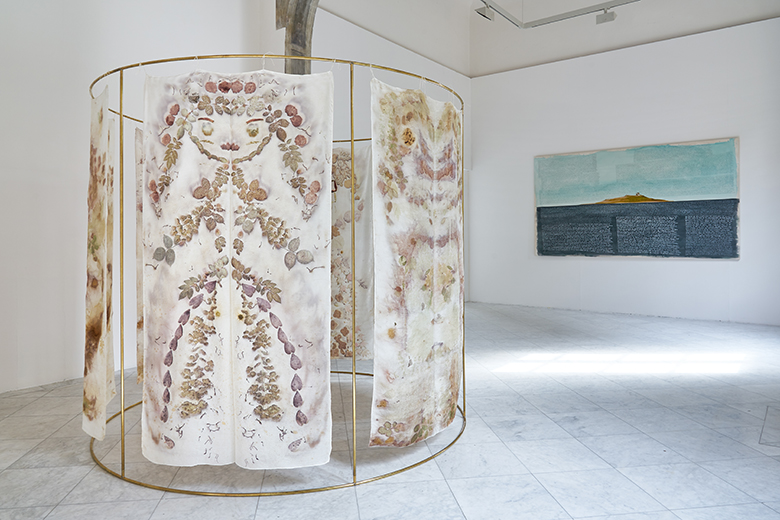
exhibition view, Chiara Camoni, Tenda #03, 2020 /2021 (left), Stefania Galegati, Isola #48, 2021 (right)
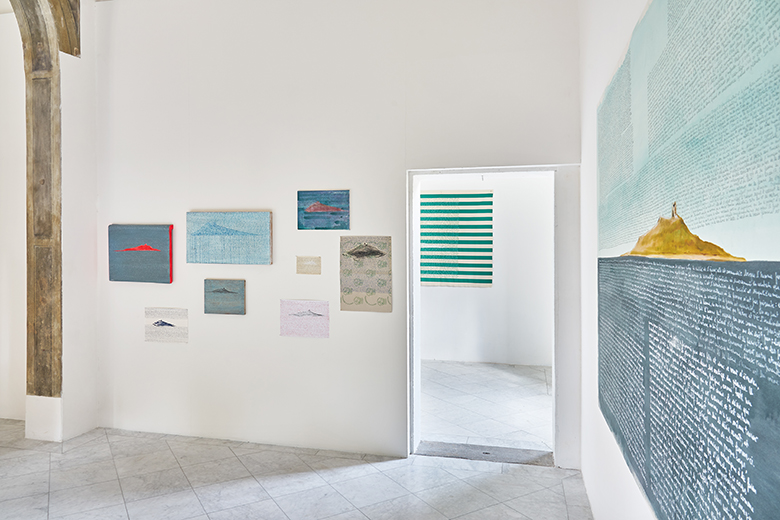
exhibition view
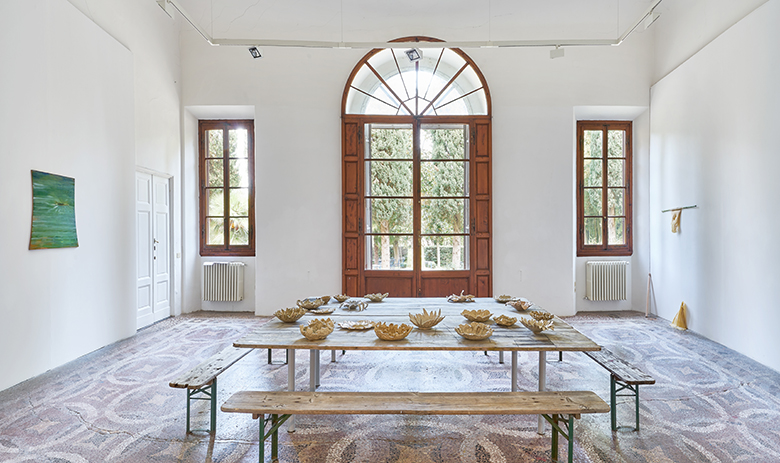
exhibition view, Stefania Galegati, Buco nell'acqua, 2017 (left), Chiara Camoni, Piatti, 2021 (middle), Stefania Galegati, Azdora, 2021 (right)
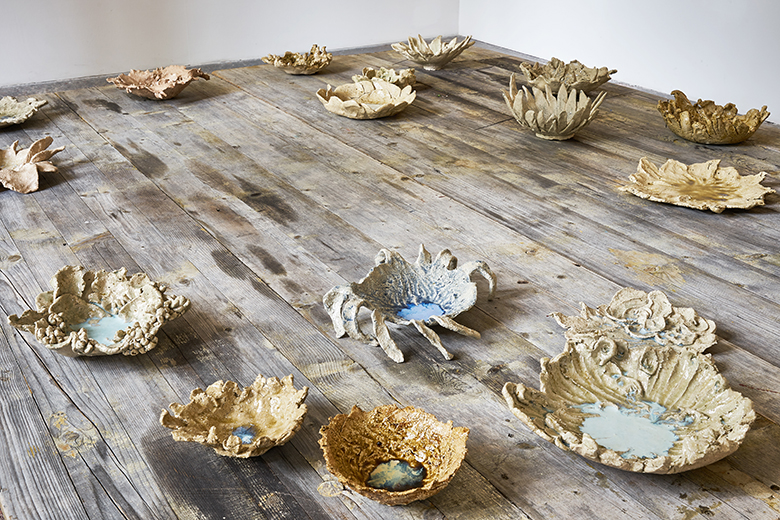
exhibition viewChiara Camoni, Piatti, 2021 (detail)
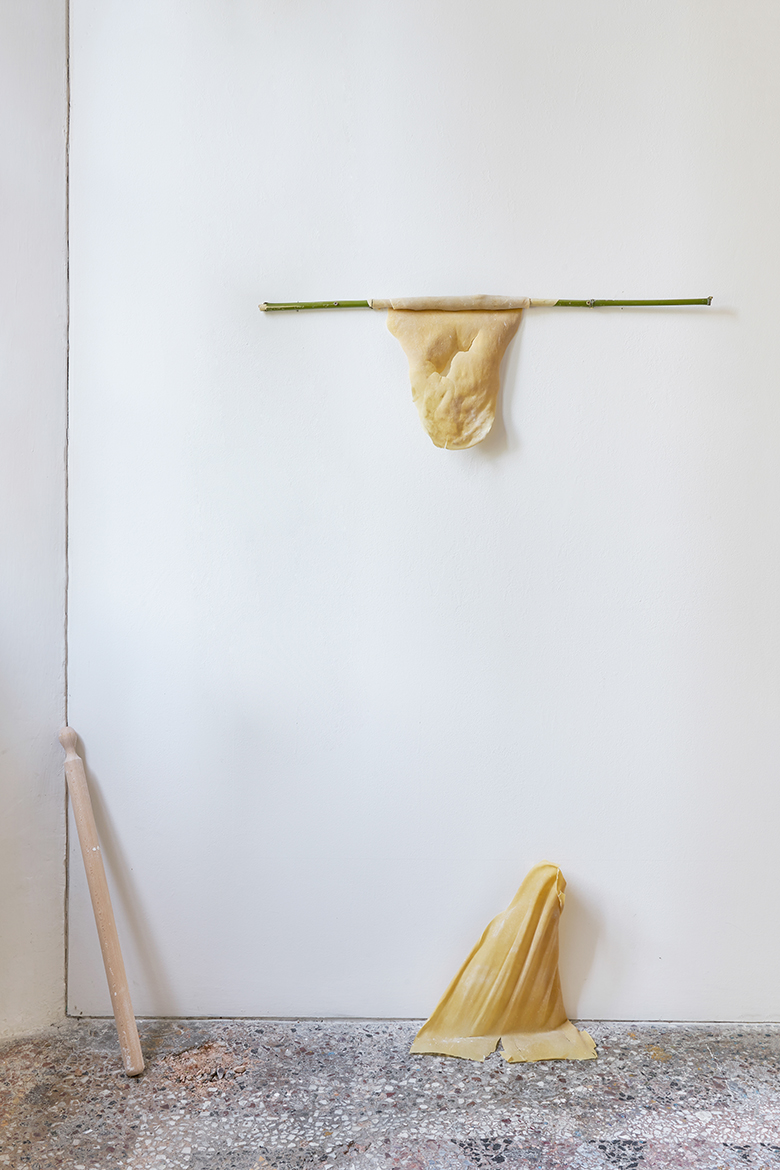
exhibition view, Stefania Galegati, Azdora, 2021
photos: Ela Bialkowska /OKNOstudio
Life and Herstories (Autobiography as Dialogue) is a cycle of exhibitions, actions and meetings conceived to stimulate reflection on the autobiographical approach as a – prevalently – female practice aimed at dialogue, the creation of small and large communities and the rewriting of official history. The project comprises two exhibitions and collateral events that further expand the perspectives.
The artists' choice suggests paths of research addressing the admixture of art and life, with a largely anti-heroic approach to narration. The project also explores the possibility of a writing about art (art criticism) that explores the encounter with art from an autobiographical perspective.
The retrieval of one's personal story – important in certain avantgarde and neo-avantgarde practices – is pivotal to the female and feminist approach through the intersection of art and anthropology. It is also fundamental to the most recent post-colonial narrations that introduce non-Eurocentric viewpoints to construct stories other than the dominant one. Life and Herstories (Autobiography as Dialogue) pays particular attention to the relation between autobiographical elements and the story of the other.
The first exhibition opens on 25 September and presents the work of Chiara Camoni and Stefania Galegati. On display are two separate groups of works by each artist, and a collective work involving others too. Here the research of the two artists is combined with words and actions produced together with Sandra Burchi, Cecilia Canziani, Daria Filardo, Elena Magini and Arabella Natalini. Objects and traces deriving from this encounter, which took place prior to the show, build into a joint work that will occupy one room in the exhibition and will be enriched over the course of the event.
The close relations between art and life are reflected in the work of both artists. Stefania Galegati pays particular attention to observing and sharing the social processes of reality, which she then transforms through painting, installation, video and collective educational actions in forms always mindful of the Other. Chiara Camoni's praxis frequently expands to a process of collective authorship (often with groups of women) and the joint realisation of works. Materials and thoughts are developed and transformed to give life to processes and creatures inhabiting the space. All the works in this first exhibition are characterised by sharing, focusing attention on the experience of the artist as part of an extended work camp where thoughts and materials entwine.
The second exhibition, which opens on 10 November, displays works by Ottonella Mocellin /Nicola Pellegrini and Helen Cammock, and explores how autobiographical accounts mesh with other human experiences to unhinge and rewrite official history. The complex narrations recompose personal and collective memories and offer a different story of the human and social relations that define our world. Again in this second appointment, a room in the show will bring together the artists’ research materials to illustrate shared itineraries and strategies.
Chiara Camoni (1974) graduated in sculpture at the Accademia di Belle Arti di Brera in Milan. She has worked at the Istituto di Scienze Naturali in Naples. Together with other artists she founded the MAGra, Museo d'Arte Contemporanea di Granara and the Vladivostok group. With Cecilia Canziani she is currently developing the series of seminars and workshops La Giusta Misura. She lives and works in Fabbiano, in the Tuscan hills of Versilia.
Stefania Galegati (Bagnacavallo, 1973) studied visual arts at the Accademia di Belle Arti di Bologna and in Brera with Alberto Garutti. She works with different media, triggering mechanisms of semantic shift in people and in things. She has been living in Palermo since 2008. She managed Caffè Internazionale from 2015 to 2018; in 2015 she co-founded Counterproduction, Summer school of contemporary art in Palermo, with Daria Filardo and Davide Ricco. In 2020 she co-founded the Femminote association.
Ottonella Mocellin and Nicola Pellegrini were born in Milan, respectively in 1966 and 1962. They moved to London in 1984 and stayed there until 1993, studying Public art and Architecture at the Chelsea School of Art and the Architectural Association. Employing photography, video, voice, sound, text, embroidery, drawing and performance, their production includes a series of shared projects that explore the boundaries between narration and identity, memory and history, personal and collective, biography and autobiography. Since 2012 they have been living in Berlin with their two children Rosa Dao and Tito.
Helen Cammock was born in 1970 in Staffordshire. She lives and works in Brighton and London. She won the Turner Prize in 2019. Using film, photography, prints, texts, songs and performance, Cammock explores the social sphere, calling the dominant historic narrations into question. Her stories chiefly portray marginal and oppressed communities, paying particular attention to the female condition and black identity.
In collaboration with


